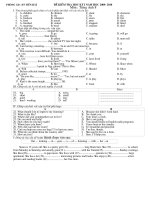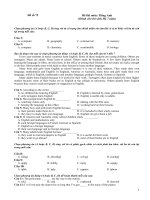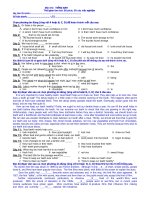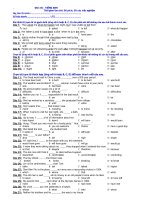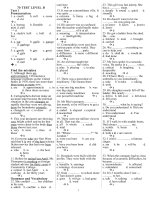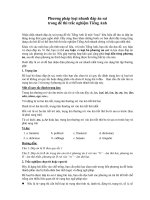- Trang chủ >>
- Sư phạm >>
- Quản lý giáo dục
Download Đề thi trắc nghiệm Tiếng anh lớp 11
Bạn đang xem bản rút gọn của tài liệu. Xem và tải ngay bản đầy đủ của tài liệu tại đây (104.3 KB, 6 trang )
<span class='text_page_counter'>(1)</span><div class='page_container' data-page=1>
<b>ONTHIONLINE.NET</b>
BỘ GIÁO DỤC VÀ ĐÀO TẠO <b>ĐỀ THI TRẮC NGHIỆM </b>
<b>MÔN Tiếng Anh 11 - Ban D</b>
<i>Thời gian làm bài: phút; </i>
<i>(80 câu trắc nghiệm)</i>
<b>Mã đề thi 135</b>
Họ, tên thí sinh:...
Số báo danh:...
Choose one word whose underlined part is pronounced differently from that of the other three<b>. </b>
<b>Câu 1: </b> <b>A. ruin</b> <b>B. race</b> <b>C. iron</b> <b>D. run</b>
<b>Câu 2: </b> <b>A. carry</b> <b>B. park</b> <b>C. yard</b> <b>D. card</b>
<b>Câu 3: </b> <b>A. admired</b> <b>B. collected</b> <b>C. posed</b> <b>D. supposed</b>
<b>Câu 4: </b> <b>A. measure</b> <b>B. adventure</b> <b>C. mature</b> <b>D. pasture</b>
<b>Câu 5: </b> <b>A. measure</b> <b>B. pleasure</b> <b>C. decision</b> <b>D. passion</b>
<b>Choose the word which has a different stress pattern from that from that of the other three.</b>
<b>Câu 6: </b> <b>A. variety</b> <b>B. characterize</b> <b>C. irrational</b> <b>D. industrial</b>
<b>Câu 7: </b> <b>A. popular</b> <b>B. magazine</b> <b>C. parachute</b> <b>D. dangerous</b>
<b>Câu 8: </b> <b>A. effective</b> <b>B. comfortable</b> <b>C. important</b> <b>D. surprising</b>
<b>Câu 9: </b> <b>A. exercise</b> <b>B. computer</b> <b>C. accurate</b> <b>D. customer</b>
<b>Câu 10: </b> <b>A. yesterday</b> <b>B. uniform</b> <b>C. applicant</b> <b>D. employment</b>
Choose from the four options given (marked A, B, C, and D) one best answer that expresses a similar
meaning as the original one.
<b>Câu 11:</b> “Where are you spending your holidays?” Mary asked us.
<b>A. Mary asked us where we were spending our holidays</b>
<b>B. Mary asked us where were we spending our holidays.</b>
<b>C. Mary asked us where you were spending your holidays.</b>
<b>D. spending Mary asked us where we were our holidays</b>
<b>Câu 12:</b> “I will pay back the money, Gloria.” said Ivan.
<b>A. Ivan offered to pay Gloria the money back.</b>
<b>B. Ivan promised to pay back Gloria’s money</b>
<b>C. Ivan apologized to Gloria for borrowing her money.</b>
<b>D. Ivan suggested paying back the money to Gloria.</b>
<b>Câu 13:</b> “Cigarette?” he asked. “No, thanks.” I said.
<b>A. He mentioned a cigarette, so I thanked him.</b>
<b>B. He asked if I was smoking, and I denied at once.</b>
<b>C. He asked for a cigarette, and I immediately refused.</b>
<b>D. He offered me a cigarette, so I promptly declined.</b>
<b>Câu 14:</b> “If I were you, I would take the job,” said my sister.
<b>A. My sister introduced the idea of taking the job to me.</b>
<b>B. My sister was thinking about taking the job.</b>
<b>C. My sister advised me to take the job.</b>
<b>D. My sister insisted on taking the job for me.</b>
<b>Câu 15:</b> “You should have finished the report by now,” John told his secretary.
</div>
<span class='text_page_counter'>(2)</span><div class='page_container' data-page=2>
<b>B. John said that his secretary had not finished the report.</b>
<b>C. John reminded his secretary of finishing the report on time.</b>
<b>D. John scolded his secretary for not having finished the report.</b>
Choose from the four options given ( marked A, B, C, and D) one best sentence written from given
words/phrases<b>.</b>
<b>Câu 16:</b> man/ sentence/ 15 years/ prison/ he/ prove/ guilty
<b>A. The man will get a sentence for himself to 15 years in prison if he proves himself guilty.</b>
<b>B. The man was sentenced about 15 years in prison and proved himself guilty.</b>
<b>C. The man was sentenced to 15 years in prison because he had been proved guilty.</b>
<b>D. The man should make his final sentence after 15 years in prison as he proved himself guilty</b>
<b>Câu 17:</b> you/ really/ be/ able/ dress/ yourself/ age!
<b>A. You have really been able of dressing yourself by your age!</b>
<b>B. You are really able to dressing yourself this age!</b>
<b>C. You must really be able of dressing yourself in your age!</b>
<b>D. You should really be able to dress yourself at your age!</b>
<b>Câu 18:</b> imagine/ who/ happen/ run into/ yesterday/ just
<b>A. Could you imagine who happened to run into us just yesterday?</b>
<b>B. Have you just imagined who happened to run into yesterday?</b>
<b>C. Just imagine who I happened to run into yesterday!</b>
<b>D. You just imagine who happened to run into yesterday!</b>
<b>Câu 19:</b> provide/ your handwriting/ legible/ test scorer/ accept/ your answer
<b>A. Providing your handwriting is legible, the test scorer does not accept your answer.</b>
<b>B. Provided that your handwriting is legible, the test scorer will accept your answer.</b>
<b>C. Providing with your legible handwriting, every test scorer must accept your answer.</b>
<b>D. Provided for your legible handwriting, the test scorer has to accept your answer.</b>
<b>Câu 20:</b> opinion/ election/ fair
<b>A. My opinion was fair about the election</b>
<b>B. In my opinion, I think the election was fair.</b>
<b>C. In my opinion, the election was fair.</b>
<b>D. According to my opinion, the election was fair.</b>
<b>Read the following text and choose the best answer </b>
People appear to be born to compute. The numerical skills of children develop so early and so
inexorably that it is easy to imagine an internal clock of mathematical maturity guiding their growth.
Not long after learning to walk and talk, they can set the table with impressive accuracy — one place,
one knife, one spoon, one fork, .for each of the five chairs. Soon they are capable of noting that they
have placed five knives, spoons, and forks on the table, a bit later, that this amounts to fifteen pieces
of silverware. Having thus mastered addition, they move onto subtraction. It seems almost reasonable
to expect that if a child were secluded on a desert island at birth and retrieved seven years later, he or
she could enter a second-grade mathematic class without any serious problems of intellectual
adjustment.
</div>
<span class='text_page_counter'>(3)</span><div class='page_container' data-page=3>
<b>Câu 21:</b> What is the main idea of the text?
<b>A. Trends in teaching mathematics to children</b>
<b>B. The fundamental concepts of mathematics that children must learn.</b>
<b>C. The development of mathematical ability in children.</b>
<b>D. The use of mathematics in child psychology.</b>
<b>Câu 22:</b> It can be inferred from the text that children normally learn simple counting ________
<b>A. after they reach second grade in school</b>
<b>B. by looking at the clock</b>
<b>C. when they begin to be mathematically mature</b>
<b>D. soon after they learn to talk</b>
<b>Câu 23:</b> The author implies that most small children believe that the quantity of water changes when
it is transferred to a container of a different ________.
<b>A. weight</b> <b>B. shape</b> <b>C. color</b> <b>D. quality</b>
<b>Câu 24:</b> According to the text, when small children were asked to count a pile of red and blue
pencils, they _________.
<b>A. counted the number of pencils of each color</b>
<b>B. counted only the pencils of their favorite color</b>
<b>C. guessed the total number of pencils</b>
<b>D. subtracted the number of red pencils from the number of blue pencils</b>
<b>Câu 25:</b> With which of the following statements would the author be <i>least </i>likely to agree?
<b>A. Mathematical development is subtle and gradual.</b>
<b>B. Most people follow the same pattern of mathematical development.</b>
<b>C. Children learn to add before they learn to subtract.</b>
<b>D. Children naturally and easily learn mathematics.</b>
<b>Read the following text and choose the best answer </b>
The population of the world has increased more in modern times than in all other ages of history
combined. World population totaled about 500 million in 1650. It doubled the period from
1650-1850. Today the population is more than five billion. Estimates based on research by the United
Nations indicate that it by the year 2000, it will reach seven billion of the century.
No one knows the limits of population that the earth can support. Thomas Malthus, an English
economist, developed a theory that became widely accepted in the nineteenth century. He suggested
that because world population tended to increase more rapidly than the food supply, a continual strain
was exerted upon available resource. Malthus cited wars, famines, epidemics, and other disasters as
the usual limitations of population growth. With recent advances in science and technology, including
improved agricultural methods and great strides in medicine, some of the limiting factors in
population growth have been lessened, with obvious results. International organizations have
recommended programs to encourage general economic development in target areas along with a
decrease in birth rates to effect a lasting solution.
<b>Câu 26:</b> The title below that best expresses the ideas in this passage is ….
<b>A. Thomas Malthus Theory</b>
<b>B. A Brief History of Population and Overpopulation</b>
<b>C. Limiting Factors in Population Growth</b>
<b>D. The United Nations' Estimate</b>
<b>Câu 27:</b> According to this passage, by the year 2000 the earth's population should exceed the present
figure by how much?
<b>A. 500 billion</b> <b>B. Seven billion</b> <b>C. Five billion</b> <b>D. two million</b>
<b>Câu 28:</b> Who was Thomas Malthus
<b>A. A doctor of medicine</b> <b>B. A scientist</b>
<b>C. A United Nations representative</b> <b>D. An economist scientist</b>
</div>
<span class='text_page_counter'>(4)</span><div class='page_container' data-page=4>
<b>A. Scarcity</b> <b>B. Improved technology</b>
<b>C. Precaution</b> <b>D. Disasters</b>
<b>Câu 30:</b> What do most experts recommend in order to solve problems of overpopulation?
<b>A. Medical advance and improved agricultural methods</b>
<b>B. Famine and epidemic</b>
<b>C. Economic development and a decline in the birth rate</b>
<b>D. Conversation of available resources</b>
<b>Read the following text and choose the best answer</b>
When we have guests to our house, we should be very polite to them, welcome them as warmly as 1
(31)______ and try to behave properly to become a welcome guest if we are (32)______ to any
formal or informal get-togethers.
It is (33)_________, and sometimes very important to learn about the standards of courtesy of
different cultural areas of the world so that we can practice them well and (34)_______ awkwardness
in case we get a chance to visit a person or a community of unfamiliar (35)________ customs.
The Americans, (36) __________ instance, tend to be informal while they’re receiving company
or coming for a social engagement. On the whole, women don’t usually shake hands as they are
introduced to each other (37) __________men do. When a man and a woman are introduced, shaking
hands is up to the woman. And (38)__________, which means arriving on time, is probably one of
the most necessary and graceful manners in public relations. Most people (39)__________ it
discourteous and inconvenient to arrive at an important appointment later than the time (40)
________ upon.
<b>Câu 31: </b> <b>A. well</b> <b>B. possibility</b> <b>C. possible</b> <b>D. possibly</b>
<b>Câu 32: </b> <b>A. informed</b> <b>B. advised</b> <b>C. invited</b> <b>D. asked</b>
<b>Câu 33: </b> <b>A. interestingly</b> <b>B. interesting</b> <b>C. interestedly</b> <b>D. interested</b>
<b>Câu 34: </b> <b>A. avoid</b> <b>B. hide</b> <b>C. have</b> <b>D. get</b>
<b>Câu 35: </b> <b>A. social</b> <b>B. personal</b> <b>C. international</b> <b>D. living</b>
<b>Câu 36: </b> <b>A. in</b> <b>B. with</b> <b>C. of</b> <b>D. for</b>
<b>Câu 37: </b> <b>A. and</b> <b>B. if</b> <b>C. when</b> <b>D. but</b>
<b>Câu 38: </b> <b>A. punctuate</b> <b>B. punctuality</b> <b>C. punctually</b> <b>D. punctual</b>
<b>Câu 39: </b> <b>A. say</b> <b>B. think</b> <b>C. find</b> <b>D. expect</b>
<b>Câu 40: </b> <b>A. discussed</b> <b>B. bargained</b> <b>C. argued</b> <b>D. agreed</b>
<b>Choose the best answer to fill in each blank in the following sentences</b>
<b>Câu 41:</b> It turned out that we ______ rushed to the airport as the plane was delayed by several hours.
<b>A. should have</b> <b>B. needn’t have</b> <b>C. mustn’t</b> <b>D. hadn’t</b>
<b>Câu 42:</b> Some small islands along the coast of Vietnam are still not ________
<b>A. inhabited</b> <b>B. habited</b> <b>C. lived</b> <b>D. inherited</b>
<b>Câu 43:</b> Be _______!. You can’t expect me to do all that work.
<b>A. reasoned</b> <b>B. reasonably</b> <b>C. reasonable</b> <b>D. reasonless</b>
<b>Câu 44:</b> The government _________ the flood victims with food, clothes and money.
<b>A. gave</b> <b>B. offered</b> <b>C. provided</b> <b>D. presented</b>
<b>Câu 45:</b> How many _____________ were there in all?
<b>A. competitiveness</b> <b>B. competitive</b> <b>C. competition</b> <b>D. competitors</b>
<b>Câu 46:</b> When I met him two weeks ago, he told me that he ________ from the USA.
<b>A. just returned</b> <b>B. had just returned</b> <b>C. just returns</b> <b>D. has just returned</b>
<b>Câu 47:</b> Don’t believe in whatever this man says. He’s a(n)________ person.
</div>
<span class='text_page_counter'>(5)</span><div class='page_container' data-page=5>
<b>Câu 48:</b> ________ the bad weather, we had to delay our trip.
<b>A. Because</b> <b>B. Because of</b> <b>C. Inspite of</b> <b>D. Although</b>
<b>Câu 49:</b> Your rice field is more _____________ than ours.
<b>A. producing</b> <b>B. productive</b> <b>C. productional</b> <b>D. products</b>
<b>Câu 50:</b> The Russians have ________ in controlling urban growth.
<b>A. attempted</b> <b>B. achieved</b> <b>C. managed</b> <b>D. succeeded</b>
<b>Câu 51:</b> Little Women,……….in 1868, is my sister’s favorite book.
<b>A. a novel published</b> <b>B. a novel was published</b>
<b>C. was a novel published</b> <b>D. is a novel published</b>
<b>Câu 52:</b> We _________ our homework by tomorrow evening.
<b>A. have finished</b> <b>B. had finished</b> <b>C. will have finished</b> <b>D. will finish</b>
<b>Câu 53:</b><i> __________</i>someone has a key, we can’t get into the house.
<b>A. When</b> <b>B. As long as</b> <b>C. If</b> <b>D. Unless</b>
<b>Câu 54:</b> Shy people often find it difficult to... group discussions
<b>A. get in touch with</b> <b>B. take place in</b> <b>C. get on with</b> <b>D. take part in</b>
<b>Câu 55:</b> Medieval travelers’ tales of fantastic creatures were often fascinating but not always
_________.
<b>A. creditable</b> <b>B. credible</b> <b>C. credulous</b> <b>D. imaginable</b>
<b>Câu 56:</b> My cousin obviously didn’t …… much of an impression on you if you can’t remember her.
<b>A. make</b> <b>B. do</b> <b>C. build</b> <b>D. create</b>
<b>Câu 57:</b> We ________ the play for nearly thirty minutes when he came.
<b>A. had watched</b> <b>B. have watched</b>
<b>C. had been watching</b> <b>D. have been watching</b>
<b>Câu 58:</b> Sorry you can’t see our Director now. He is busy _________ a report.
<b>A. to writing</b> <b>B. of writing</b> <b>C. writing</b> <b>D. to write</b>
<b>Câu 59:</b> I’d rather you __________ on time.
<b>A. come</b> <b>B. came</b> <b>C. to come</b> <b>D. coming</b>
<b>Câu 60:</b> My ________ is broken. I want to have a new one.
<b>A. tea cup</b> <b>B. cupping tea</b> <b>C. cup for tea</b> <b>D. cup of tea</b>
<b>Choose the incorrect part in those sentences</b>
<b>Câu 61:</b> To use (A) a calculator, (B) one can easily (C) convert kilos to pounds and Celsius (D) to
Fahrenheit.
<b>Câu 62:</b> This is (A) the gun with that (B) the (C) murder was committed.(D)
<b>Câu 63:</b> My grandfather, that is (A) a wise man, (B) has greatly influenced (C) my life. (D)
<b>Câu 64:</b> After (A) his illness, he was (B) advised to take over (C) gardening as (D) a hobby.
<b>Câu 65:</b> This (A) is my (B) brother, who's (C) wife is French. (D)
<b>Câu 66:</b> Sheep (A) have been domesticated (B) for (C) over 5,000 years ago.(D)
<b>Câu 67:</b> Since rats are destructive (A) and may carry (B) disease, therefore many (C) cities try to
exterminate them.(D)
<b>Câu 68:</b> Made up of more than (A) 150 member countries, the organization known (B) as the United
Nations were (C) established after World War II to preserve (D) international peace and security.
<b>Câu 69:</b> Adam is a wall building (A) across a river to stop (B) the river’s flow (C) and collect (D)
the water.
<b>Câu 70:</b> The trouble (A) started when (B) we were told to change (C) the way the department was
running. (D)
</div>
<span class='text_page_counter'>(6)</span><div class='page_container' data-page=6>
<b>Câu 71:</b> Richard was asked to withdraw from graduate school because __________.
<b>A. he was deemed incapable of completing his research</b>
<b>B. they believe he was not able to complete research</b>
<b>C. it was decided that he was not capable to complete the research</b>
<b>D. his ability to finish the research was not believed or trusted</b>
<b>Câu 72:</b> John’s score on the test is the highest in the class; __________.
<b>A. he should study last night</b> <b>B. he must had to study last night</b>
<b>C. he must have studied last night</b> <b>D. he should have studied last night</b>
<b>Câu 73:</b> __________, he would have signed his name in the corner.
<b>A. If he would have painted that picture</b> <b>B. If he painted that picture</b>
<b>C. If he paints that picture</b> <b>D. If he had painted that picture</b>
<b>Câu 74:</b> He has received several scholarships __________.
<b>A. not only because of his artistic but his academic ability</b>
<b>B. as resulting of his ability in the art and the academy</b>
<b>C. for both his academic ability as well as his artistic</b>
<b>D. because of his academic and artistic ability</b>
<b>Câu 75:</b> Jane changed her major from French to business, _________.
<b>A. with the hope for being able to find a better job</b>
<b>B. hoping she can easier get a job</b>
<b>C. hoping to find a job more easily</b>
<b>D. with hopes to be able easier to locate employment</b>
<b>Câu 76:</b> The doctor insisted that his patient___________.
<b>A. take it easy for three months</b> <b>B. to take some vacations for three months</b>
<b>C. that he not work too hard for three months</b> <b>D. taking it easy inside of three months</b>
<b>Câu 77:</b> __________, he would have been able to pass the exam.
<b>A. Had he studied more</b> <b>B. If he were studying to a greater degree</b>
<b>C. Studying more</b> <b>D. If he studied more</b>
<b>Câu 78:</b> While attempting to reach his home before the storm, ___________.
<b>A. the storm caught John</b> <b>B. it happened that John’s bike broke down</b>
<b>C. John had an accident on his bicycle</b> <b>D. John’s bicycle broke down</b>
<b>Câu 79:</b> The manager was angry because somebody___________.
<b>A. had allowed the photographers to enter the building</b>
<b>B. permitting the photographers enter the building</b>
<b>C. the photographers let into the building without the proper documentations</b>
<b>D. had let the photographers to enter the building</b>
<b>Câu 80:</b> __________ did Arthur realize that there was danger.
<b>A. When he entered the store</b> <b>B. After he had entered the store</b>
<b>C. Upon entering the store</b> <b>D. Only after entering the store</b>
</div>
<!--links-->
